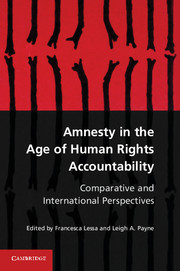Book contents
- Frontmatter
- Contents
- Contributors
- Foreword
- Acknowledgments
- Introduction
- Part I Theoretical Framework
- Part II Comparative Case Studies
- 3 Amnesties’ Challenge to the Global Accountability Norm?
- 4 From Amnesty to Accountability
- 5 Barriers to Justice
- 6 Resistance to Change
- 7 De Facto and De Jure Amnesty Laws
- 8 Creeks of Justice
- 9 Accountability through Conditional Amnesty
- 10 De Facto Amnesty?
- 11 A Limited Amnesty?
- 12 The Spanish Amnesty Law of 1977 in Comparative Perspective
- Conclusion Amnesty in the Age of Accountability
- Bibliography
- Index
- References
9 - Accountability through Conditional Amnesty
The Case of South Africa
Published online by Cambridge University Press: 05 June 2012
- Frontmatter
- Contents
- Contributors
- Foreword
- Acknowledgments
- Introduction
- Part I Theoretical Framework
- Part II Comparative Case Studies
- 3 Amnesties’ Challenge to the Global Accountability Norm?
- 4 From Amnesty to Accountability
- 5 Barriers to Justice
- 6 Resistance to Change
- 7 De Facto and De Jure Amnesty Laws
- 8 Creeks of Justice
- 9 Accountability through Conditional Amnesty
- 10 De Facto Amnesty?
- 11 A Limited Amnesty?
- 12 The Spanish Amnesty Law of 1977 in Comparative Perspective
- Conclusion Amnesty in the Age of Accountability
- Bibliography
- Index
- References
Summary
At a time when amnesty appears well on its way toward pariah status among transitional policy options, South Africa’s bold attempt, in the mid-to-late 1990s, to incorporate a generous domestic amnesty arrangement into an accountability process for politically motivated crimes deserves our attention. This chapter reviews the history and implementation of South Africa’s conditional amnesty law and its longer term domestic impact. It also offers an assessment of this policy option as a blueprint for an accountability mechanism to be employed in other political transitions.
A REVIEW OF SOUTH AFRICA’S CONDITIONAL AMNESTY SCHEME
South Africa’s amnesty scheme for politically motivated offenders is sometimes presented as a restrictive one in which amnesty is confined to perpetrators who acted in a morally defensible way. Such benign perceptions of the scheme are put into question by the generosity and ease with which amnesty was granted by the Amnesty Committee for atrocious deeds. In this section, I draw on the results of my empirical study of the Amnesty Committee’s decisions to argue that the practical scope of the scheme was in fact much broader than many international observers believe it to have been, and address the implications of these findings.
- Type
- Chapter
- Information
- Amnesty in the Age of Human Rights AccountabilityComparative and International Perspectives, pp. 238 - 262Publisher: Cambridge University PressPrint publication year: 2012
References
- 1
- Cited by



